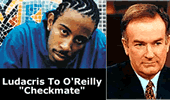|
Hip-Hop
Makes Bill O'Reilly Irrelevant
Bakari
Akil II
February
16, 2003
Last
year, popular FOX TV and radio host Bill
O'Reilly went on a crusade attacking corporations
who had Hip-hop artists endorsing their
products. In one specific case he called
upon his merry band of loyal followers to
boycott Pepsi due to their association with
a popular artist named Ludacris. He labeled
the artist a thug and a danger to young
people's minds because of his lyrics, which
he cited as being offensive to women and
full of drug references, profanity and violence.
After his initial call for a boycott, Pepsi
was flooded with over 3000 calls the following
day from angry customers threatening to
stop using their products if they allowed
Ludacris to remain as a spokesman for their
corporation. In response, they quickly canceled
their contract with the artist, sent out
an apology to the American public and a
precedent was set or rather enforced.
Bill O'Reilly had made his move and put
the world of Hip-hop and Pepsi in check.
However, not to be outdone, Hip-hop made
a countermove and put Bill O'Reilly in checkmate.
This week he admitted on his TV show that
Pepsi rescinded its decision to distance
themselves from Ludacris. Not only did Pepsi
renew their association with the artist
they also agreed to a multi-year, multimillion-dollar
commitment to the Ludacris Foundation and
"inner-city youth".
Regardless of African Americans feelings
toward the lyrical content of these artists
the underlying implications of O'Reilly's
actions were easily apparent to astute members
of the Hip-hop and greater African American
community. Bill O'Reilly is following a
long-standing tradition, in US culture,
of attacking and persecuting successful,
affluent and influential African American
men. Whether or not the Hip-hop or the larger
African American community agreed with Ludacris'
politics the behavior by O'Reilly was recognizable
and had to be stopped.
It must also be stated that this reversal
by Pepsi did not occur because they were
feeling sorry for their actions. It was
a result of intense pressure the company
received after their announcement. The response
was immediate by journalists and columnists
who felt that O'Reilly had overstepped his
bounds. Hip-hop publications, Black media
outlets and people who had a sense of fairness
immediately exposed the event for what it
was and called for countermeasures for O'Reilly's
action. Ludacris remained silent but stated
that he was diligently working toward taking
care of the situation.
It was "Murder she wrote" when
Russell Simmons and the Hip-Hop Summit Action
Network stepped into the fray and notified
the world that Pepsi would soon be facing
a boycott especially after they created
a commercial originally aired during the
2003 Super Bowl which featured the Osbournes.
This is a family whose aberrant public behavior
has become a national obsession and is broadcast
almost daily on MTV. The show is laced with
heavy profanity, underage alcohol usage,
troubled teens and a dysfunctional family
life, which is by no means a good example
for children to pattern themselves after.
The hypocrisy was apparent and Pepsi was
called to task.
As Pepsi realized the amount of negative
publicity they were receiving, the speed
at which the news regarding the impending
boycott reached the Black community and
the possible loss of income they were likely
to face from one of the most powerful ethnic
groups in the US in terms of disposable
income, they made the wisest decision and
re-negotiated with Ludacris and his representatives.
The results obtained by the actions of journalists,
Hip-hop media, the Hip-hop Summit Action
Network, Russell Simmons and Ludacris demonstrated
what activists and economists in the Black
community have been shouting all along and
that is the Black community has the economic
resources and strategic and intellectual
clout to make meaningful differences and
power moves if they use their leverage and
work together.
Overall, this event is larger than Ludacris
and the irrelevant Bill O'Reilly. It proves
to the Black community that they have a
largely untapped power within themselves.
Furthermore, the Hip-hop community has or
will gain respect from other segments of
the community as a force that can create
change and make things happen. Finally,
corporations and others nay-sayers have
been put on notice that the Hip-hop and
Black community cannot be pushed around
or as Eddie Murphy's character in the movie
Life stated,
'There
will be consequences and repercussions."
Bakari Akil is an editor for GlobalBlackNews.com
and can be reached at [email protected]
|